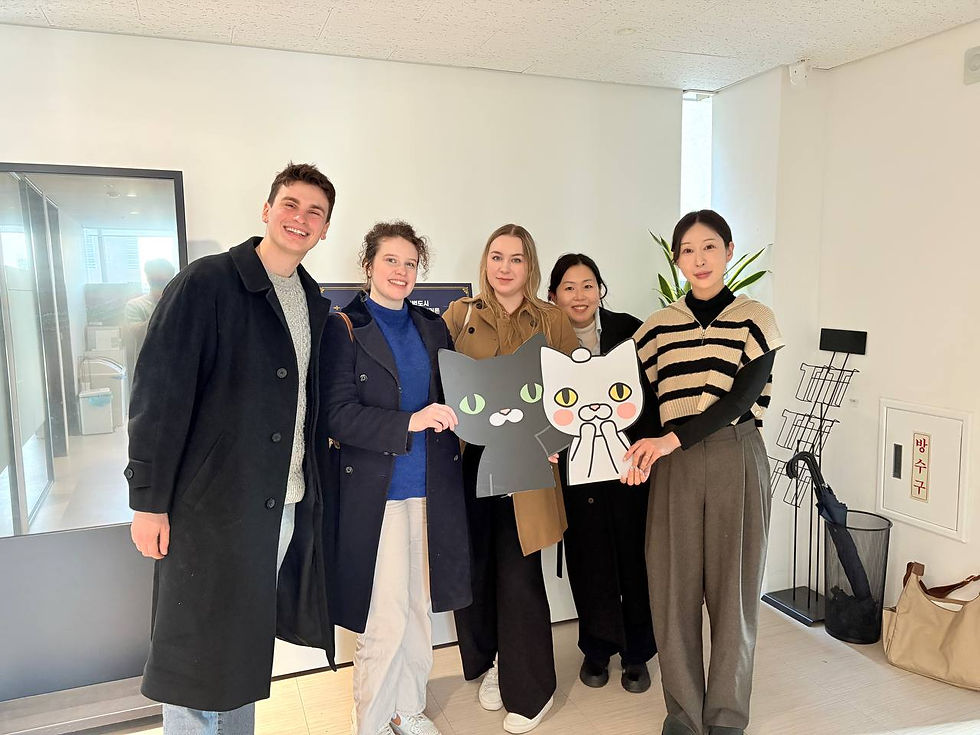Industry Project 2024/2025: Aseman Lapset
- idbm00
- Jul 1, 2025
- 3 min read
The IDBM Industry Project Course is a seven-month journey of collaboration, exploration, and innovation, where students addressing real-world challenges in collaboration with industry partners. This year, we’re inviting you to follow 10 different stories as our teams move through different stages of their project journeys.
At first glance, school conflict might seem like just part of growing up: arguments in the hallway, teasing on the playground, maybe a parent-teacher meeting or two. But beneath the surface, these moments can carry much deeper emotional weight. Left unaddressed, they can spiral into conflicts that impact not only students but entire communities. These situations shape how safe children feel, how much trust exists between families and schools, and how well adults are able to work together to support the young people in their care.
As Team Aseman Lapset: Jihae Kim, Johanna Weigel, Isaac Jyväsjärvi, Jenny Leppänen, and Liselotte Molin we partnered with Aseman Lapset ry to explore a complex and emotional question: How can AI support adults in preparing for youth mediation with more clarity, reflection, and emotional awareness?

Aseman Lapset’s work focuses on building safety and trust among young people through school-based programs, street mediation, and social support. One of their key services is youth mediation, a dialogue-driven process where trained mediators help students resolve interpersonal conflict. During our early conversations, we heard a recurring challenge: mediation sessions are often made more complex not by the children and youth, but by the adults around them. Parents and teachers can arrive angry, defensive, or emotionally overwhelmed, making it difficult to create space for calm, constructive dialogue.
To understand this better, we interviewed school staff, mediators, and social workers. Because of the sensitivity of the topic, we did not speak directly with children, but instead focused on the professionals who support them. Through these discussions, one key insight became clear the real opportunity was not inside the mediation room, but in the preparation that leads up to it.
In February, we traveled to Seoul, South Korea, to explore how AI and emotional support tools are used in other cultural and social contexts. There, we encountered examples of AI being used to support mental health and reflection. These tools did not replace human care, but made it more accessible and structured. This inspired us to think about how similar technology could be used to support emotional preparation for school mediation here in Finland.
The result of this journey is Mirra a digital reflection tool we designed to help adults process their emotions and perspectives before a mediation session begins. Mirra guides users through reflective prompts, helping them describe what happened, how they feel, and what they need. It then uses AI to organize this input into a clear timeline and a short emotional summary. With the user’s consent, this summary can be shared with the mediator to help them prepare with greater understanding and empathy.

We developed Mirra in close collaboration with Aseman Lapset. We tested early mockups with professionals in the field, refining the tone, interface, and experience to make sure the tool felt supportive and safe. It was important to us that Mirra didn't feel clinical or judgmental, but rather calm, clear, and human.
At the Impact Gala, we presented our work through a staged final pitch. Using storytelling and performance, we explored the emotional landscape of school conflict through the eyes of a child. Alongside this, we showcased a working prototype of Mirra, which visitors could try out live. People were able to input their thoughts and see how the AI reflected their emotional tone back to them. The feedback we received was encouraging and helped affirm our belief in the project’s potential.
While Mirra is still in its early stages, we hope it will continue to grow within Aseman Lapset’s ecosystem. Our goal is for it to become a tool that supports mediators, schools, and families across Finland creating space for reflection before conflict escalates, and helping adults show up with greater clarity and care.
Learn more about the team:
Jihae Kim (CoID) – LinkedIn
Johanna Weigel (CoID) – LinkedIn
Isaac Jyväsjärvi (IDBM Business) – LinkedIn
Jenny Leppänen (IDBM Tech) – LinkedIn
Liselotte Molin (IDBM Design) – LinkedIn


















